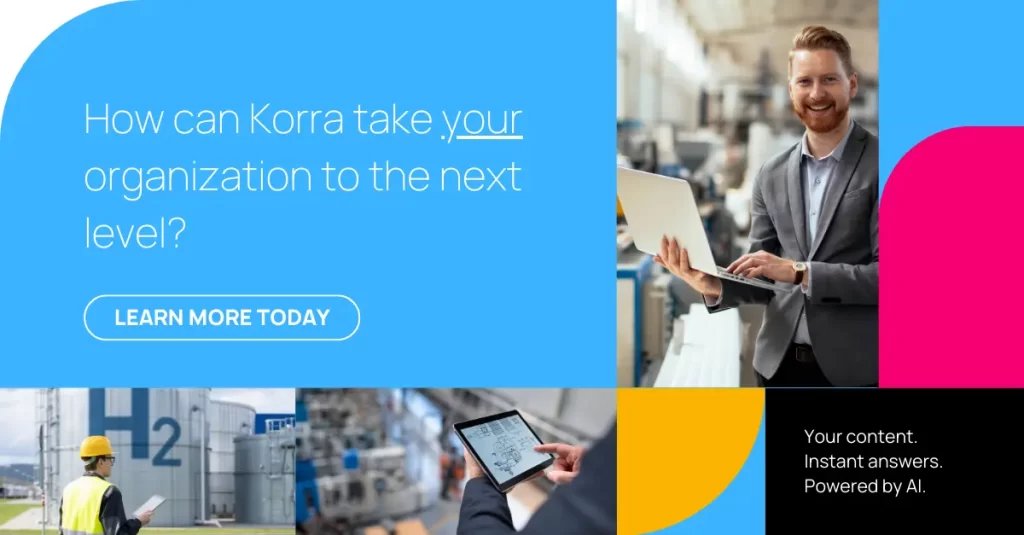For many companies, bridging the digital divide seems an insurmountable challenge. We’ll show that it’s not only more achievable than you might believe, but technology will be your key ally in this effort.
Discover how to navigate this journey, the potential pitfalls and ways to overcome them, and how to effectively leverage your existing content to achieve your most ambitious business goals.
The Organizational Drag Of Legacy Content
Around 90% of digital transformation efforts fail. There are several reasons for this, but one of the most interesting ones, posited by Dr. Didier Bonnier, Professor of Strategy & Digital Transformation at IMD in Switzerland, is the pace of managing the transition between old and new. Specifically, this occurs when organizations try to digitize too quickly, skipping key steps.
On the other hand, leadership teams are being pressured by Boards, shareholders, customers, and other stakeholders to take advantage of the AI revolution. To do this effectively, they need their legacy content – be it manuals, procedures, previous work, and other proprietary knowledge – to be in a format that lends itself to this new AI wave.
This leads us to the current situation. The majority of companies today are stuck – weighed down by legacy content, the idea of catching up with industry leaders using digitization and AI appears daunting.
But does it have to be?
What Your AI Knowledge Base of the Future Could Look Like
Let’s compare this to the successes enjoyed by organizations that have successfully navigated this challenge.
Consider the case of Semi Corp., a large semiconductor producer. Its field engineers are constantly moving from site to site, checking equipment to maintain optimal operating conditions and safety standards.
If an engineer notes a problem with a specific machine, they can access Semi Corp’s AI-powered internal knowledge base from their device. They can ask a question in human terms, without having to overthink keywords or the structure of the request.
This knowledge base accesses the entirety of the company’s knowledge – from videos to technical drawings, PDFs to website text, and including the full depth of historical service cases – to deliver the exact answer the engineer needs, complete with a multi-modal search experience: the answer will include the technical drawings needed, the exact section in the procedure document and a simple summary of all historical cases of this unit or examples of similar historical cases with similar symptoms, as well as the context surrounding the answer to assure its accuracy.
The engineer can then ask follow-up questions in a chat experience, giving them deeper insights and a better understanding of the issue.
The result? A precise answer, in the shortest time possible, from anywhere, leveraging AI and the company’s entire corpus of knowledge; not to mention a happier and more engaged employee, and the highest level of safety and efficiency.
The question becomes: How can legacy companies transition from their current reliance on outdated content to a future where they seamlessly harness the power of AI?

Bridging Now to Next: Integrating AI into Your Future Growth Strategy
As we’ve seen, one of the greatest stumbling blocks to the adoption of effective AI in internal knowledge bases and beyond, is legacy content. This includes content formats that are not easily accessible to modern indexing technologies, as well as content stored in a distributed, non-centralized or under-optimized manner.
Consider these scenarios for a traditional organization exploring the transition to AI transformation:
- It decides to use a commercial LLM platform (such as OpenAI), albeit fine-tuned, to draw answers from the internet; for example, if a field engineer is searching for a specific step, it might return an answer from a technical blog of another company
- It manages to digitize part of its legacy content; for example it digitizes all text documents (but not PDFs or videos) and connects these bodies of text to its AI-powered knowledge base, ostensibly enabling users to draw answers from this text
- It embarks on a massive project to convert legacy content to future-ready formats, for example by transcribing or labeling videos, converting PDFs to text, and so on
- It decides not to go ahead with the transition
Each of these carries significant risk.
In Scenario 1, the likelihood of confident, wrong answers is extremely high. An example of this is an LLM “hallucination” – where an incorrect answer to a question is provided – a phenomenon frequently encountered on open platforms such as ChatGPT, as models are trained on both real and synthetic data. For manufacturing and industrial companies, among others, the margin of error is so tiny that this type of solution is completely unacceptable. If a troubleshooting step contains an inaccuracy, or a step is missing, this can result in disaster, including the loss of life.
Scenario 2 could be even worse. If an AI-powered knowledge base is limited to just a fraction of a company’s institutional knowledge, its full potential goes untapped, and the risk of providing incorrect or incomplete answers remains significantly high.
In Scenario 3, the resources required for this endeavor – including but not limited to time and costs – are very often prohibitive. This also includes the opportunity cost of what is not achieved while the focus is on this project. In short it’s inefficient, bordering on wasteful.
The final case, Scenario 4, is setting the organization up for failure. While competitors leverage cutting-edge technology – boosting safety and efficiency while attracting top talent that wants to work in this environment – a company choosing this scenario will be left behind, a Kodak or BlackBerry that fails to read where the industry is moving.
There is another option.
Korra enables you to leverage the full potential of your own company knowledge, with a private ChatGPT-like support platform.
It runs exclusively on your own corpus of knowledge, ensuring precise and accurate answers. Critically, thanks to its Knowledge Fusion Engine,™ it is able to support all your content: from videos to PDFs, spreadsheets, historial cases and ticket history, HTML, and beyond.
You simply connect your file storage to Korra, and the system does the rest.
It’s that simple. No heavy projects, no extended timelines, no risk.
Both analog and legacy digital content can be seamlessly digitized and integrated into modern, accessible formats, enhancing content management systems for better compatibility with new technologies, driving high engagement and satisfaction.
And users – from employees to customers – can interact with your AI-enhanced knowledge base completely naturally, without keyword hunting or query manipulation, and can ask follow-up questions GPT-style.
Harness Your Content for an AI Powered Knowledge Base
With Korra, industrial and manufacturing companies, not to mention any organization that wants to power its knowledge base with the potential of AI, can achieve a superior user experience, streamlined support processes, and increased operational efficiencies.
As Dr. Bonnier puts it, “The key to more successful digital transformation is to not skip ahead: Start with step one and invest the focus and resources to get it right. Growing your organization’s digital maturity through the digital transformation corporate learning curve will increase your chances of success.”
Korra stands out as the low-risk, high-impact Step One for companies looking to engage with the AI-driven future.
